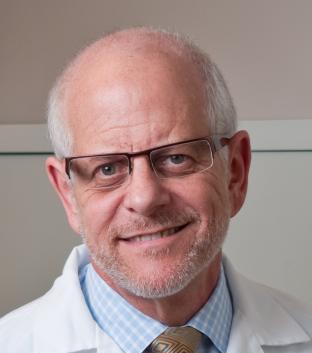Biography
Dr. Marc Peters-Golden is a physician-scientist and Professor of Internal Medicine in the Division of Pulmonary and Critical Care Medicine. He was the Division's Fellowship Program Director from 1996-2011 and its Associate Program Director for Research Training from 2011-2019. He has also served as Associate Director of the Division's T32 NIH Postdoctoral Research Training Grant.
He joined the faculty at UM in 1984 after completing his M.D. at Duke University School of Medicine, his residency in Internal Medicine at Tufts-New England Medical Center, and his clinical and research training in Pulmonary Diseases at Johns Hopkins University.
He is an elected member of the American Society for Clinical Investigation and the Association of American Physicians. He is a recipient of the American Thoracic Society's Recognition Award for Scientific Achievement.
Research Interests
My research centers on the molecular and cellular biology of lung injury, inflammation, immunity, repair, and fibrosis. Using normal cells, cells from diseased patients, and animal models of disease, we study the biology of lung macrophages and other immune cells, epithelial cells, and fibroblasts. We are particularly interested in receptors, mediators, cell signaling, and transcriptional programs that control cell fate and function. Ongoing projects include:
- the role of extracellular vesicles as vectors for cell-cell communication in the lung;
- mechanisms controlling alveolar macrophage proliferation;
- the role of macrophages in allergic inflammation;
- transcriptional programs in fibroblasts that govern proliferation, collagen synthesis, and myofibroblast differentiation. Our ultimate goal is to gain novel insights into lung homeostasis and disease pathogenesis, and to identify new strategies for therapeutic targeting. Mentoring is an important focus of mine, and my laboratory consists of a highly interactive and collaborative group of M.D. and Ph.D. trainees from around the world.
Research Opportunities for Rotating Students
Extracellular vesicles as vectors of cell-cell communication in the lung.
We have recently shown that alveolar macrophages secrete suppressors of cytokine signaling (SOCS) in extracellular vesicles, which can be taken up by epithelial cells to inhibit cytokine-induced JAK-STAT inflammatory signaling (Bourdonnay E, J Exp Med 2015;212(5):729-42). Secretion by alveolar macrophages and uptake by epithelial cells are both regulated processes, and can be altered in inflammatory conditions. A variety of rotation projects are available to participate in ongoing studies to address the many questions about this phenomenon that remain unanswered.
Molecular regulation of lung fibroblast activation.
Fibrotic tissue responses affect virtually all organs and are important causes of morbidity and mortality. Pulmonary fibrosis is a devastating disease. Fibroblasts are the key effector cells of fibrogenesis. We have longstanding research interests in understanding pathways controlling the fibroblast activation phenotype (proliferation, differentiation to myofibroblasts, extracellular matrix deposition and survival), its dysregulation in pulmonary fibrosis, and how it might be reprogrammed. Rotation projects are available to participate in studies of transcriptional regulation of fibroblast programs, expression of endogenous anti-fibrotic molecules, and therapeutic development and testing.
Novel insights in asthma pathogenesis.
We have studied various aspects of allergic asthma pathogenesis and airway remodeling due to chronic allergen challenge. A current focus of interest is understanding how alveolar macrophages restrain the development of allergic asthmatic inflammation, including the potential roles of secreted SOCS and prostaglandin E2, and how SOCS secretion is dysregulated in allergic asthma.Rotation projects in these areas may be available.


